
Chinese President Xi Jinping and US President Donald Trump agreed to restart trade talks in Japan where nearly half a century ago an encounter between ping-pong players staged a historic breakthrough for bilateral ties.
It's a recalibration moment. A consensus reached at the G20 Osaka summit pulled the two countries from the brink of confrontation, injecting much-needed confidence into the global economy and markets.
The two countries have been locked in a trade battle for almost one year and a red flag has been raised over the damaging impact if the trade dispute continued to escalate.
The tit-for-tat wrangle would cost the world $455 billion in lost output next year, an amount higher than the size of South Africa's economy, the International Momentary Fund warned when leaders of G20 economies gathered in Osaka.

(File photo: VCG)
The world was eager to see the arrival of a pivot point, where the world's biggest economies could go back to the negotiation table, which fits the interests of both countries and the global economy.
Apart from bilateral trade, urgent tasks ranging from meaningful WTO reform to a deteriorating situation in the Middle East require joint efforts from China and the US. Two countries have highly integrated interests and extensive cooperation areas, and they should not fall into the trap of conflict and confrontation.
However, it's far from assured that the resumption of trade talks will lead to a mutually acceptable deal since we have observed flip flops in previous rounds of negotiations.
In their Osaka meeting, Xi and Trump agreed to continue trade talks on the basis of equality and mutual respect, a stance Chinese negotiators had reiterated to their US counterparts. The US fulfilling this commitment is vital for the success of future negotiations.
A more open approach to the whole world gives China more leeway in managing the consequences of the trade dispute. With more measures to open the economy in place, China will surely maintain its vigor and build up a stronger capability to handle potential turmoil.
During the meeting, Trump also signaled his goodwill, saying he harbors no hostility towards China. It's hoped that his words could be translated into a real change that could reduce the atmosphere of strategic mistrust as Washington discusses and implements China-related policies.
China has ascended to a new geopolitical status after decades of reform and opening up, a new reality that the US needs to adapt to. As Singaporean Prime Minister Lee Hsien Loong put it, China can no longer expect to be treated the same way as in the past when it was much smaller and weaker. Each must understand the other's point of view, and reconcile each other's interests.


